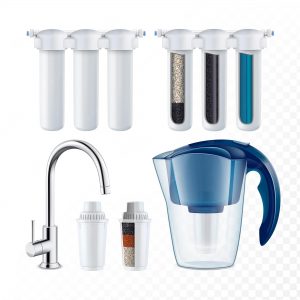5 Best Ways To Choose A Water Filter For Your Home
 Water is essential for life, yet many places around the world have water that is unsafe to drink. Even in areas that don’t have this problem, drinking water from a bottle or faucet is not always advisable. This is because we are constantly exposed to different contaminants and pollutants through our drinking water. Unfortunately, most of these contaminants pose a threat to our health as they can lead to illnesses like diarrhea, urinary tract infections, and other complications. In this article, we will discuss some of the best ways to choose a water filter for your home.
Water is essential for life, yet many places around the world have water that is unsafe to drink. Even in areas that don’t have this problem, drinking water from a bottle or faucet is not always advisable. This is because we are constantly exposed to different contaminants and pollutants through our drinking water. Unfortunately, most of these contaminants pose a threat to our health as they can lead to illnesses like diarrhea, urinary tract infections, and other complications. In this article, we will discuss some of the best ways to choose a water filter for your home.
Check The Water Quality Report
The first thing you need to do is check the water quality report of your area. This report will list all the contaminants in your water along with the levels. This information can help you determine which type of water filter is best for your home. If you have hard water, you should look for a water filter that can reduce the hardness of water. If there are high amounts of iron in the water, you should look for a water filter that can eliminate iron. You should also check the pH level of the water. Low-pH water can affect the surface of your water filter, which can reduce its lifespan.
Know Your Water Filter Options
There are several types of water filters available in the market. These include carbon filters, UV filters, and RO filters. Each of these water filters has its own pros and cons. If you have a low water pressure at home, you should go for a carbon filter. Carbon filters are cheap, and they can remove iron, chlorine, and some bacteria from the water. If you have high iron in your water or hard water, you should go for a reverse osmosis (RO) filter. It is an excellent choice as it can remove almost everything from water. If you have low pH water, you should go for a UV filter as it can increase the pH level of your water.
Check The Filtration Capacity
The next thing you need to do is check the filtration capacity of the water filter you are planning to buy. You can either check the capacity in gallons or in microns. The filtration capacity of a water filter is the ability to remove impurities from the water. If you have a low water pressure at home, you should go for a water filter with a large capacity. If you have a high water pressure, you should go for a water filter with a low capacity. If your water has a high amount of iron, go for a water filter with a high capacity. This will help to reduce the amount of iron in your water.
Stay Within Your Budget
Another important thing you need to keep in mind while choosing the best water filter for your home is your budget. The price of water filters can vary depending on their brand and model. You should look for a water filter that fits your budget and has all the features you need. If you have a low budget, don’t worry. There are water filters available in the market that cost less while still being effective. If you want to save some money and water, you can look for a water filter with a dual stage filtration system. This kind of filter can be a great choice for most households. If you have a large family, you should go for a water filter with a high capacity. A high-capacity water filter will reduce the amount of contaminants in your water and save you a lot of money.
Know The Dimensions Beforehand
The installation and size of the water filter you choose should match the size of your tap. This will make installation easier and also save you some time and effort. You should also keep in mind the storage and cleaning requirements of your water filter before you buy it. Some water filters require you to clean them every few months. Some require you to clean them every year. Some even require you to clean them every 3 years. You should select a water filter that is easy to clean and doesn’t require too much effort.
Select A Water Filter With A TDS Meter
A TDS meter is a recommended feature while choosing a water filter. A TDS meter can help you to determine the quality of the water. If your water doesn’t have any contaminants, the meter will display a zero reading. However, if there are impurities in the water, the meter will display a high reading. A high reading on the meter indicates that there are impurities in your water. If you have hard water, you should go for a water filter with a TDS meter. This will help you to monitor the amount of impurities in your water. A TDS meter can also indicate when it’s time to clean your water filter. A water filter with a TDS meter can help you to monitor the quality of your drinking water. If you have low pH water, you can go for a water filter without a TDS meter as it won’t show you the quality of your water.
Conclusion
The water filter you choose should be able to remove the impurities in your water and make it safe to drink. It should be easy to install and clean. It should also be durable and reliable. The 5 tips we discussed above can help you to choose the best water filter for your home.
